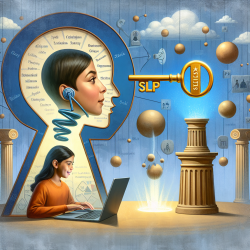Introduction
The recent study titled "Building Resilience and Social–Emotional Competencies in Elementary School Students through a Short-Term Intervention Program Based on the SEE Learning Curriculum" offers insightful data on enhancing children's social-emotional skills. Conducted in Daegu, South Korea, the research focuses on the SEE Learning program's impact on resilience and social-emotional competencies in elementary students. This blog aims to guide practitioners in applying these findings to improve their therapeutic interventions.
Understanding the SEE Learning Program
SEE Learning (Social, Emotional, and Ethical Learning) is a comprehensive curriculum developed by Emory University, emphasizing resilience, mindfulness, compassion, and ethical practices. This curriculum is designed to foster social-emotional competencies in students, particularly in post-COVID-19 educational settings.
Key Findings from the Research
The study involved 348 third and fourth graders across 15 schools, with a curriculum focusing on resilience, attention, kindness, and compassion. The results showed statistically significant improvements in:
- Resilience and its subscales: self-efficacy, tolerance of negative affect, positive support relations, power of control, and spontaneity.
- Social and emotional competencies: emotional regulation, social skills, empathy, and social tendencies.
These improvements suggest that SEE Learning effectively enhances students' resilience and social-emotional well-being, even in short-term interventions.
Implications for Practitioners
For practitioners in speech-language pathology and related fields, integrating SEE Learning principles can significantly impact therapeutic outcomes. Here are some practical steps:
- Incorporate Mindfulness and Compassion: Use mindfulness exercises to help children regulate emotions and develop empathy.
- Focus on Resilience Building: Implement activities that promote self-efficacy and positive support relations.
- Adapt to Short-Term Interventions: Tailor sessions to fit within school terms, ensuring that the core components of SEE Learning are covered.
Encouraging Further Research
While the study provides valuable insights, it also highlights the need for further research to explore long-term effects and the integration of SEE Learning in diverse educational settings. Practitioners are encouraged to contribute to this growing body of evidence by documenting and sharing their experiences and outcomes.
Conclusion
SEE Learning offers a robust framework for enhancing children's resilience and social-emotional skills, particularly in the wake of COVID-19. By integrating these practices into therapeutic interventions, practitioners can create more meaningful and lasting impacts on children's development.
To read the original research paper, please follow this link: Building Resilience and Social–Emotional Competencies in Elementary School Students through a Short-Term Intervention Program Based on the SEE Learning Curriculum.










